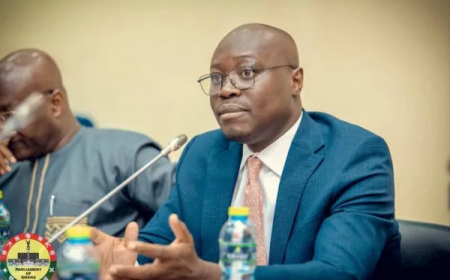24-Hour Economy and 4 Other Major Interventions in Ghana’s 2025 Budget
The Ghanaian government has unveiled its 2025 Budget, introducing bold interventions to stimulate economic growth and job creation. Among the most significant policies is the introduction of a 24-hour economy, a transformative initiative aimed at boosting productivity and enhancing employment opportunities. Here are five major interventions from the 2025 Budget that seek to reset the economy for prosperity and accountability.

One of the most ambitious policies in the 2025 Budget is the introduction of a 24-hour economy, designed to increase business productivity and create more job opportunities. This initiative will allow businesses, especially in key sectors such as manufacturing, services, and retail, to operate around the clock. To support this transition, the government is expected to introduce incentives such as tax breaks, reduced energy tariffs for night operations, and improved security measures. This policy aims to maximize economic output and reduce unemployment by offering more flexible work shifts.
2. The “Big Push” Infrastructure Initiative
The budget outlines a GH₵13.85 billion investment in infrastructure under the “Big Push” initiative. This funding will be directed towards roads, bridges, railways, energy, and healthcare infrastructure. The government aims to improve connectivity, boost trade, and create thousands of construction jobs, ultimately fostering long-term economic development.
3. Establishment of the Ghana Gold Board (GOLDBOD)
Ghana remains one of the largest gold producers in Africa, yet the sector has faced regulatory and revenue leakages. To address this, the government is setting up the Ghana Gold Board (GOLDBOD) with a US$279 million allocation. GOLDBOD will regulate the gold sector, curb illegal mining, ensure fair pricing, and optimize revenue collection. This move is expected to increase government earnings from gold exports while promoting sustainable mining practices.
4. Strengthening of Social Intervention Programs
The 2025 Budget increases funding for essential social programs to support vulnerable groups. Key allocations include:
-
National Health Insurance Scheme (NHIS): GH¢9.93 billion allocated to cover healthcare services, essential medicines, and vaccines.
-
School Feeding Programme: Funding increased from GH¢1.344 billion to GH¢1.788 billion, raising the per-meal cost per child from GH¢1.50 to GH¢2.00.
-
Trainee Allowances: GH¢203 million and GH¢480 million allocated for teacher and nursing trainee allowances, respectively.
These interventions will enhance access to healthcare, improve educational support, and strengthen the workforce in critical sectors.
5. Uncapping of Statutory Funds for Development
To ensure efficient funding of essential services, the government has lifted caps on key statutory funds. The Road Fund will receive GH¢2.81 billion for road maintenance, a 155.5% increase from previous allocations. Additionally, the District Assemblies Common Fund (DACF) will receive GH¢7.51 billion, with at least 80% of these funds directed toward local-level development projects. This move aims to improve public infrastructure, boost local economies, and enhance service delivery.
Conclusion
The 2025 Budget presents a transformative agenda focused on economic revitalization and job creation. The introduction of a 24-hour economy, coupled with strategic infrastructure investments, regulatory reforms, enhanced social interventions, and increased statutory funding, signals a strong commitment to national development. If effectively implemented, these interventions have the potential to reshape Ghana’s economic landscape, fostering inclusive growth and long-term prosperity.
What's Your Reaction?



















































































